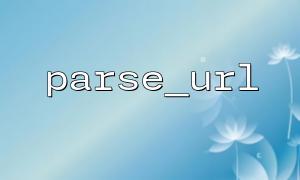When using PHP to process URLs, parse_url is a very common function. It can decompose a URL into different parts, such as protocol (scheme), host (host), path (path), query parameters (query), etc. However, in actual development, we may encounter a special situation: more than one question mark ( ? ) appears in the URL. At this time, can parse_url still work normally? This article will conduct a detailed analysis of this issue.
The basic syntax of parse_url is as follows:
$url = "https://gitbox.net/path/to/page?name=foo&age=20";
$parsed = parse_url($url);
print_r($parsed);
The output result is as follows:
Array
(
[scheme] => https
[host] => gitbox.net
[path] => /path/to/page
[query] => name=foo&age=20
)
From this example, we can see that parse_url can accurately parse various components of the URL. What if there are multiple question marks in the URL?
In the standard URL specification, only one question mark can be used in a URL to separate paths and query strings. For example:
https://gitbox.net/page?first=1&second=2
But in reality, it is not always so "rules". Sometimes we come across some "non-standard" URLs, such as:
https://gitbox.net/page??id=123?name=jack
Let's take a look at how parse_url will parse this type of URL:
$url = "https://gitbox.net/page??id=123?name=jack";
$parsed = parse_url($url);
print_r($parsed);
Output result:
Array
(
[scheme] => https
[host] => gitbox.net
[path] => /page
[query] => ?id=123?name=jack
)
As you can see, parse_url will not throw an error when encountering multiple question marks, but will use the first question mark as the separation point between "path" and "query parameters", and all subsequent content will be regarded as part of the query string. In other words, it only recognizes the first question mark, and subsequent question marks will be considered as ordinary characters and retained in the query part.
This means that if you use parse_url to process URL input from users or third parties and those URL structures are not standard (including multiple question marks), you need to be extra careful. Although parse_url will not report an error, its output may not meet your expectations.
for example:
$url = "https://gitbox.net/path??sort=asc?filter=active";
$parsed = parse_url($url);
echo $parsed['query']; // Output: ?sort=asc?filter=active
If you next parse_str to parse query , you will find that it may not parse out the key-value pairs you want.
If you expect to deal with irregular URLs, you can consider the following ways:
Preprocessing URL : "clean" the URL in advance with regular expressions or string operations, and process or replace the unnecessary question marks.
$url = preg_replace('/\?{2,}/', '?', $url);
Manually refactor the query part : Use strpos to find the first question mark and manually separate the path and query string, and then customize the processing.
Don't rely on parse_url to get query parameters : If you only care about the content of the query part, you can directly extract the part from the URL ? and then use parse_str .
$queryPart = substr($url, strpos($url, '?') + 1);
parse_str($queryPart, $params);
parse_url is a powerful tool, but it is not omnipotent. Especially when facing some "non-standard" URLs, such as those containing multiple question marks, their behavior needs to be understood clearly by the developers. The key is: parse_url only recognizes the first question mark, and the rest are all classified into query , and multiple query segments will not be automatically identified. Therefore, when the data source is not controlled, we must preprocess the URL to avoid logical errors caused by misinterpretation.
Related Tags:
URL













